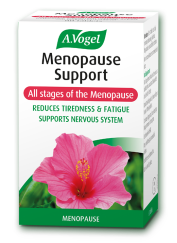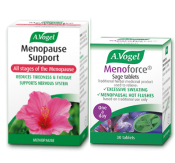Read the full video transcript below
Today's topic
Today on A.Vogel Talks Menopause, I thought I would talk about what happens after the menopause, when the menopause starts and how long the menopause actually lasts. I get an awful lot of queries about this from women who are really not quite sure when everything starts and stops.
At what age does the menopause start?
So to start with, the average age at which you will commence the approach the menopause is roughly 45 to 55.
The majority of women will start in this particular age group; however, there are a number of women that will start earlier. It can be hereditary. So if your mother, your granny, your aunties, your older sisters all started slightly earlier, then that can be a very good indication that you might well start earlier too.
There can also be health issues; if you smoke, if you are extremely overweight, if you have any specific health issues, then you may actually start a little bit earlier as well. We’ve also got a very small number of women who will start a lot later; I’ve actually heard of women who are 58 and 59 who are still getting regular periods, although it’s just a very, very small number of women.
How long does the menopause last?
Now the menopause itself, how long does this last? It’s like a piece of string. None of us will know how long it’s actually going to take. For some women they’re going to have a quick menopause. They’re going to be through it before they know it and suddenly it’s like “wow this is it. It’s all over.” For other women, they’re going to get combinations of symptoms that come and go. They might find that the menopause stretches itself out for a good number of years, and then there are those women for who it’s really going to be the most horrendous time. They’re going to be plunged into this mix of hormonal changes that are going to make them feel very, very miserable.
And it’s difficult to say how long this is going to last for everybody. Each and every single one of you is going to have a completely unique menopause. We won’t know what’s going to happen until it actually happens, which is very confusing. It’s also very frustrating because in some ways you can’t actually plan ahead for what’s likely to actually happen. However, there is an approximate time for each stage of the menopause.
The peri-menopause
Now the peri-menopause is the point where your hormones start to change, and this can sometimes happen very, very subtly. You might not actually realise that you’re in the menopause. Your hormones could actually have been changing for a couple of years before you suddenly think, “Wait a minute. Things are not quite the same.” This is also the point that can be very, very confusing because you can be having completely regular normal periods, but you can start to get menopause symptoms. Now the main symptoms that tend to cause confusion at this particular point would be things like joint aches and pains, fatigue, digestive problems, palpitation, headaches and nausea.
Going to the doctor
Very often you will go to the doctor with these symptoms. You might find you’re getting lots of palpitations. You’ll get everything checked out. You’ll be hooked up to a monitor. You might get tested for joint aches and pains. You’ll go back to the doctor and the doctor will say, “There’s nothing wrong. Nothing has come up on the tests.” But if you are in the 45 to 55 age group, if you’re still getting completely regular periods, and you’re getting strange symptoms that don’t seem to have a particular cause, then very often it’s the fact that your hormones have started to subtly change, and that these symptoms are actually manifesting themselves at this particular point.
How long does peri-menopause last?
For some women the peri-menopause will last about three years from start to finish, even though you might have been in it a little while before you actually click what’s going on. So, for some women, the peri-menopause is actually harder to deal with than the actual menopause itself, because very often once your periods stop for good, then things seem to balance out a little bit more. The problem with the point where your period stop for good is that you don’t know they’ve stopped for good until you’ve had at least one to two years without a period.
Periods coming back
Now a lot of sources state that you are through the menopause when you have not had a period for a whole year. What we have discovered is that a lot of women actually will get the odd period after a year. This can be due to various factors. It can just be the fact that your hormones are going, “Oh, I just want one last fling.” So you get one or two periods for a couple of months, and then that’s it, finished well and proper.
You can be under a lot of stress. You can suddenly be doing a lot of exercise. You can suddenly start to diet, and a very interesting point is that if you suddenly really improve your diet, then that can actually restart your periods because you’re giving the body lots of extra good nutrition, and the body goes, “Oh, it’s a little bit extra. Let’s have a little whirl.” So we tend to say to everybody that you are through the menopause when you have not had a period for two whole years. Now what happens after that? For the majority of women in the two years once your periods have actually stopped, your symptoms should start to tail off.
Is this the end of the menopause?
So, by the end of the two years, you should be seeing the light at the end of the tunnel, if you like. However, and this a huge however, this can depend on a whole range of factors. It can be your general health. How well did you look after yourself through the peri-menopause? It could be due to your diet. Are you eating well just now? It can be due to your stress factors because stress can really prolong the menopause quite dramatically. So, no matter what stage of menopause you’re at at the minute, even if you’re only just starting, it’s vital that you really look after yourself now. Because how you look after yourself at the beginning of the menopause may well determine how long it takes for you to get all the way through.
What happens after the menopause?
Now, once you get through the menopause, once the two years are up, if your symptoms are starting to tail off you should start to feel better, and it’s just a question of adapting. Our body has to learn to adapt without the hormones and there comes a point where everything plateaus out. If you have looked after yourself well, then there is no reason why you can’t have a fabulous life after the menopause.
And to be honest, once you’re without the ups and downs, and all the trauma and drama of monthly periods, it can be really wonderful because you will find that very often your mood will be a lot more level. You will have more energy. You will have more focus. You will have more drive. So the end of the day there’s absolutely no reason why you can’t feel as good if not better as you did before.
This is one of the great things to take with you. Whatever stage you’re at through the menopause, whatever is going on for you at this particular minute, just remember that at the end of it there can be an absolutely fabulous life. You can focus and you can really enjoy yourself forever after onwards if you actually want, but the important thing is please look after yourself really well.
Prepare yourself
I hope this has given you a little bit of a clue. It is a tricky one because as I said before, we don’t know what’s going to happen until we actually get there. But prepare yourself as much as you can through good diet, through relaxation and actually dealing with your stress levels.









